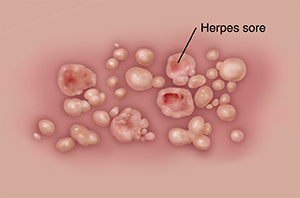A
B
C
D
E
F
G
H
I
J
K
L
M
N
O
P
Q
R
S
T
U
V
W
X
Y
Z
Topic IndexLibrary Index
Click a letter to see a list of conditions beginning with that letter.
Click 'Topic Index' to return to the index for the current topic.
Click 'Library Index' to return to the listing of all topics.
Genital Herpes
What is genital herpes?
Genital herpes is a sexually transmitted disease. It is caused by the herpes simplex virus (HSV). Herpes infections can cause blisters and ulcers on the mouth or face (oral herpes). They can also cause sores in the genital area (genital herpes). HSV is a lifelong infection.
Symptoms of genital herpes
Symptoms may include painful blisters or open sores in the genital area. They may tingle or itch. Before these symptoms appear, you may feel a tingling or burning feeling in your legs, buttocks, or genital area. The herpes sores often go away within a few weeks. But the virus stays in the body. The sores may come back from time to time.

How does genital HSV affect pregnancy?
It's important not to get herpes during pregnancy. A first flare-up during pregnancy raises the risk of spreading it to your newborn. You may be treated with an antiviral medicine such as acyclovir if the disease is severe. The disease can cause a possibly fatal infection in your baby if you have active genital herpes (shedding the virus) at the time of birth. Cesarean delivery is often recommended for active genital herpes. Fortunately, infection of a baby is rare among women with genital herpes.
Preventing transmission of herpes
It's important not to have sex when you have symptoms of active herpes. Also use latex condoms between outbreaks.
Online Medical Reviewer:
Heather M Trevino BSN RNC
Online Medical Reviewer:
Irina Burd MD PhD
Online Medical Reviewer:
Tennille Dozier RN BSN RDMS
Date Last Reviewed:
8/1/2023
© 2000-2025 The StayWell Company, LLC. All rights reserved. This information is not intended as a substitute for professional medical care. Always follow your healthcare professional's instructions.